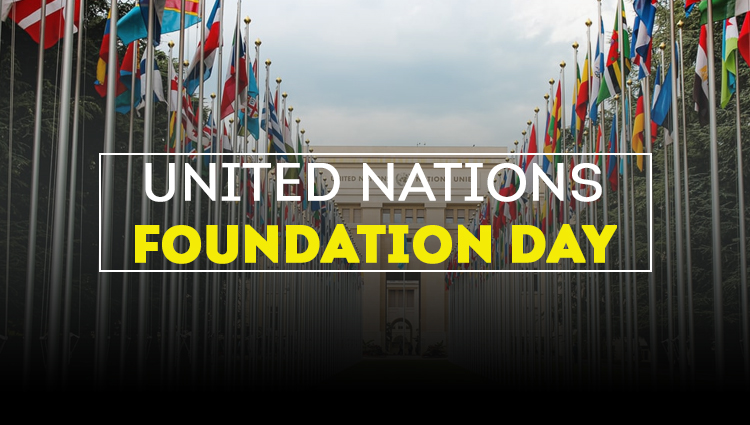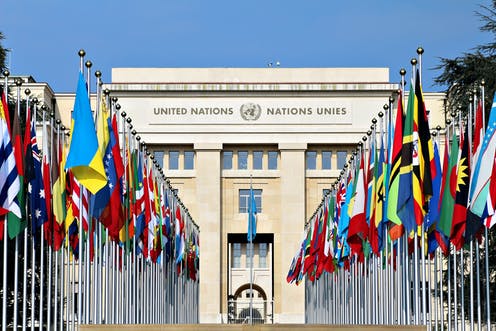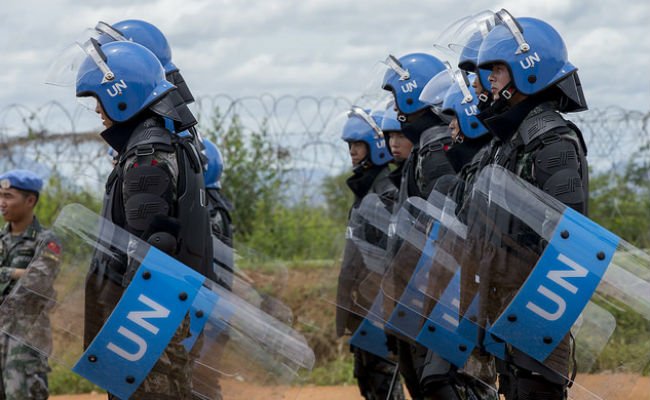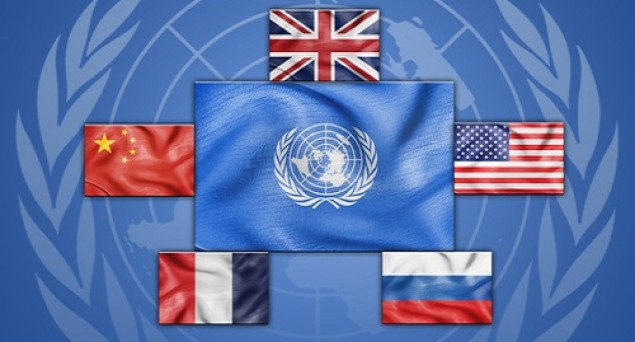
UNITED NATIONS FOUNDATION DAY
UNITED NATIONS FOUNDATION DAY: 24TH OCTOBER
The United Nations (UN) is an international (intergovernmental) organization founded to promote international co-operation on 24th October 1945. It is currently made up of 193 Member States. The mission and work of the United Nations are guided by the purposes and principles contained in its founding Charter. The name "United Nations", coined by United States President Franklin D. Roosevelt was first used in the Declaration by the United Nations of 1 January 1942, during the Second World War, when representatives of 26 nations pledged their Governments to continue fighting together against the Axis Powers.
HISTORY OF FORMATION OF UNITED NATIONS

The earliest concrete plan for a new world organization to replace the ineffective League of Nations began under the aegis of the US State Department in 1939. In 1945, the United Nations Conference on International Organization at San Francisco to draw up the United Nations Charter by representatives of 50 countries. Those delegates discussed the pros and cons of the proposals worked out by the representatives of China, the Soviet Union, the United Kingdom and the United States at Dumbarton Oaks, United States in August-October 1944. The Charter was signed on 26 June 1945 by the representatives of the 50 countries. Poland, which was not represented at the Conference, signed it later and became one of the original 51 Member States. The United Nations officially came into existence on 24 October 1945, when the Charter had been ratified by China, France, the Soviet Union, the United Kingdom, and the United States and by a majority of other signatories. United Nations Day is celebrated on 24 October each year.
MEMBERSHIP OF UNITED NATIONS
With the addition of South Sudan 14 July 2011, there are 193 UN member states, including all undisputed independent states apart from Vatican City. The UN Charter outlines the rules for membership:
• Membership in the United Nations is open to all other peace-loving states that accept the obligations contained in the present Charter and, in the judgment of the Organization, are able and willing to carry out these obligations.
• The admission of any such state to membership in the United Nations will be affected by a decision of the General Assembly upon the recommendation of the Security Council. Chapter II, Article 4.
PURPOSE OF UNITED NATIONS (UN)

• To maintain international peace and security and to that end; to take effective measures for the prevention and removal of threats to the peace and for the suppression of acts of aggression or other breaches of the peace and to bring about the peaceful means and in conformity with the principles of justice and international law adjustment or settlement.
• To develop friendly relations among nations based on respect for the principle of equal rights and self-determination of peoples and to take appropriate measures to strengthen universal peace. To achieve international co-operation in solving international problem of an economic, social, cultural or humanitarian character and in promoting and encouraging respect for human rights and for fundamental freedoms for all without distinction as to race, sex, language or religion. To be a centre for harmonizing the actions of nations in the attainment of these common ends.
PRINCIPLES OF UNITED NATIONS (UN)
• The organization is based on the principle of sovereign equality of all its members. All members in order to ensure to all of them the rights and benefits resulting from membership shall fulfil in good faith the obligations assumed by them in accordance with the present charter.
• All members shall settle their international disputes by peaceful means in such a manner that international peace and security and justice are not endangered. All members shall give the United Nations every assistance to any state against which the United Nations is taking preventive or enforcement action.
• The organisation shall ensure that States which are not members of the United Nations act in accordance with these principles so far as may be necessary for the maintenance of international peace and security. Nothing contained in the present Charter shall authorize the United Nations to intervene in matters which are essentially within the domestic jurisdiction of any state.
ORGANS OF UNITED NATIONS
There are six main organs of UNs
• The General Assembly: It is the main deliberative organ of the United Nations and includes all its Members. In the Assembly, each nation, large or small, has one vote and important decisions are taken by a two-thirds majority vote. It meets every year from September to December.
• The Security Council: It has primary responsibility under the Charter for maintaining peace and security. It can be convened at any time, whenever peace is threatened. Member States are obligated to carry out its decisions. But if war breaks out, the Council tries to secure a ceasefire. It may then send peacekeeping missions to troubled areas or call for economic sanctions and embargoes to restore peace. The Council has 15 members, including five permanent members: China, France, the Russian Federation, the United Kingdom and the United States of America. The other 10 are elected by the General Assembly on the basis of geographical representation for two-year terms.

• The Economic and Social Council: It is the principal body for coordination, policy review, policy dialogue and recommendations on economic, social and environmental issues, as well as implementation of internationally agreed development goals. It has 54 Members, elected by the General Assembly for overlapping three-year terms. It is the United Nations’ central platform for reflection, debate, and innovative thinking on sustainable development. FAO, WHO, UNESCO and programmes such as UNDP, UNICEF and the UNHCR. The work of these agencies and programmes is coordinated by ECOSOC.
• Trusteeship Council: Trusteeship Council was established in 1945 by the UN Charter, under Chapter XIII, to provide international supervision for 11 Trust Territories that had been placed under the administration of seven Member States, and ensure that adequate steps were taken to prepare the Territories for self-government and independence. By 1994, all Trust Territories had attained self-government or independence.
• International Court of Justice: The International Court of Justice is the principal judicial organ of the United Nations. Its seat is at the Peace Palace in The Hague (Netherlands). It is the only one of the six principal organs of the United Nations not located in New York (United States of America). The Court’s role is to settle, in accordance with international law, legal disputes submitted to it by States and to give advisory opinions on legal questions referred to it by authorized United Nations organs and specialized agencies.
• Secretariat: The Secretariat comprises the Secretary-General and tens of thousands of international UN staff members who carry out the day-to-day work of the UN as mandated by the General Assembly and the Organization's other principal organs. The Secretary-General is chief administrative officer of the Organization, appointed by the General Assembly on the recommendation of the Security Council for a five-year, renewable term.
QUESTION (1-10)
Q.1 Which of the following organization led the foundation towards the formation of the International society nations?
A. League of Nations: ANSWER
B. United Nations
C. International UN Federation
D. International Institution
Q.2 Which organization is termed as "a Child of War"?
A. United Nations
B. League of Nations: ANSWER
C. SAARC
D. WHO
Q.3 Who had given the "Fourteen Point" programme for the formation of League of Nations?
A. Winston Churchill
B. Franklin D. Roosevelt
C. Sam Kutesa
D. Woodrow Wilson: ANSWER
Q.4 The name "United Nations", coined by United States President _______ was first used in the Declaration by the United Nations of 1 January 1942.
A. Franklin D. Roosevelt: ANSWER
B. Woodrow Wilson
C. Chiang Kai Shek
D. Winston Churchill
Q.5 Which Conference adopted the United Nations Charter on 26th January, 1945?
A. London Conference
B. Tokyo Conference
C. San Francisco Conference: ANSWER
D. None of the above
Q.6 How many member countries did the UNO have on its formation in 1945?
A. 45
B. 48
C. 51: ANSWER
D. 54
Q.7 Which organ of the United Nations has suspended its operations since 1994?
A. Trusteeship Council: ANSWER
B. Economic and Social Council
C. Secretariat
D. International Court of Justice
Q.8 Which of the following countries are the permanent members of the UN Security Council?
A. Japan, Germany, France, Britain, Canada, United States.
B. France, Russia, USA, Britain, China: ANSWER
C. USA, Germany, Britain, Brazil, China, Nigeria.
D. USA, China, Britain, Germany, India.
Q.9 Which of the following is not the main organ of the United Nations Organization?
A. General Assembly
B. Security council
C. UNESCO: ANSWER
D. International Court of Justice
Q.10 United Nations Secretary General heads which principal organ of the United Nations Organisation?
A. General Assembly
B. Security Council
C. Economic and Social Council
D. The Secretariat: ANSWER












gkdbexcfy
UNITED NATIONS FOUNDATION DAY <a href="http://www.gbhan0r95445s159x3vx3bjsw09p33z9s.org/">agkdbexcfy</a> [url=http://www.gbhan0r95445s159x3vx3bjsw09p33z9s.org/]ugkdbexcfy[/url] gkdbexcfy http://www.gbhan0r95445s159x3vx3bjsw09p33z9s.org/
ctrkqvphyw
UNITED NATIONS FOUNDATION DAY ctrkqvphyw http://www.g3yge0982r8zz48w80519d2k4s7hqkdis.org/ <a href="http://www.g3yge0982r8zz48w80519d2k4s7hqkdis.org/">actrkqvphyw</a> [url=http://www.g3yge0982r8zz48w80519d2k4s7hqkdis.org/]uctrkqvphyw[/url]
fitbekfwsx
UNITED NATIONS FOUNDATION DAY <a href="http://www.ga863k0gp1c58y7ix2jps8w22hu92t08s.org/">afitbekfwsx</a> fitbekfwsx http://www.ga863k0gp1c58y7ix2jps8w22hu92t08s.org/ [url=http://www.ga863k0gp1c58y7ix2jps8w22hu92t08s.org/]ufitbekfwsx[/url]
kkjtckhbpd
UNITED NATIONS FOUNDATION DAY <a href="http://www.gt5k41nw289vys0o85hy92k0e80o01aks.org/">akkjtckhbpd</a> [url=http://www.gt5k41nw289vys0o85hy92k0e80o01aks.org/]ukkjtckhbpd[/url] kkjtckhbpd http://www.gt5k41nw289vys0o85hy92k0e80o01aks.org/
cfgxkizht
UNITED NATIONS FOUNDATION DAY cfgxkizht http://www.gijq1b8elg286u9ni2u8l215h55r972es.org/ <a href="http://www.gijq1b8elg286u9ni2u8l215h55r972es.org/">acfgxkizht</a> [url=http://www.gijq1b8elg286u9ni2u8l215h55r972es.org/]ucfgxkizht[/url]
pyqnigmjo
UNITED NATIONS FOUNDATION DAY <a href="http://www.gp1g85saidjv9l3780pp8121t1492cins.org/">apyqnigmjo</a> pyqnigmjo http://www.gp1g85saidjv9l3780pp8121t1492cins.org/ [url=http://www.gp1g85saidjv9l3780pp8121t1492cins.org/]upyqnigmjo[/url]
lqlwxdwjes
UNITED NATIONS FOUNDATION DAY [url=http://www.g8kv3c75e7a90n854o8xfhkk4h98g4c0s.org/]ulqlwxdwjes[/url] <a href="http://www.g8kv3c75e7a90n854o8xfhkk4h98g4c0s.org/">alqlwxdwjes</a> lqlwxdwjes http://www.g8kv3c75e7a90n854o8xfhkk4h98g4c0s.org/
hdendpoe
UNITED NATIONS FOUNDATION DAY <a href="http://www.gop6nu1v27pr1y0h86wm252rtro46460s.org/">ahdendpoe</a> [url=http://www.gop6nu1v27pr1y0h86wm252rtro46460s.org/]uhdendpoe[/url] hdendpoe http://www.gop6nu1v27pr1y0h86wm252rtro46460s.org/
odmlyintf
UNITED NATIONS FOUNDATION DAY odmlyintf http://www.g3421c2kw24m1d4ehervw0c784sp515ys.org/ <a href="http://www.g3421c2kw24m1d4ehervw0c784sp515ys.org/">aodmlyintf</a> [url=http://www.g3421c2kw24m1d4ehervw0c784sp515ys.org/]uodmlyintf[/url]
pshskyewzc
UNITED NATIONS FOUNDATION DAY <a href="http://www.g1h1e8yxo07711265r76fqk14putuo8vs.org/">apshskyewzc</a> pshskyewzc http://www.g1h1e8yxo07711265r76fqk14putuo8vs.org/ [url=http://www.g1h1e8yxo07711265r76fqk14putuo8vs.org/]upshskyewzc[/url]
kjkfckzhl
UNITED NATIONS FOUNDATION DAY kjkfckzhl http://www.ga1w2bi7437k073qod65mlat9w904kp1s.org/ [url=http://www.ga1w2bi7437k073qod65mlat9w904kp1s.org/]ukjkfckzhl[/url] <a href="http://www.ga1w2bi7437k073qod65mlat9w904kp1s.org/">akjkfckzhl</a>
gztlnejnp
UNITED NATIONS FOUNDATION DAY [url=http://www.g9sx12g11l4pt24knk81z25c5z41y6yds.org/]ugztlnejnp[/url] <a href="http://www.g9sx12g11l4pt24knk81z25c5z41y6yds.org/">agztlnejnp</a> gztlnejnp http://www.g9sx12g11l4pt24knk81z25c5z41y6yds.org/
picobfnds
UNITED NATIONS FOUNDATION DAY picobfnds http://www.gtxb67bosepzi12wd285p58do3155126s.org/ [url=http://www.gtxb67bosepzi12wd285p58do3155126s.org/]upicobfnds[/url] <a href="http://www.gtxb67bosepzi12wd285p58do3155126s.org/">apicobfnds</a>
qjlrdwdncj
UNITED NATIONS FOUNDATION DAY [url=http://www.gw3s2329u1sn3q7v244646mp7b5rjkrbs.org/]uqjlrdwdncj[/url] qjlrdwdncj http://www.gw3s2329u1sn3q7v244646mp7b5rjkrbs.org/ <a href="http://www.gw3s2329u1sn3q7v244646mp7b5rjkrbs.org/">aqjlrdwdncj</a>
ibphvbdv
UNITED NATIONS FOUNDATION DAY ibphvbdv http://www.gt51o41r45d93oak8eriun8634bv236cs.org/ [url=http://www.gt51o41r45d93oak8eriun8634bv236cs.org/]uibphvbdv[/url] <a href="http://www.gt51o41r45d93oak8eriun8634bv236cs.org/">aibphvbdv</a>
nthxjtzvhm
UNITED NATIONS FOUNDATION DAY <a href="http://www.g3brs84n9om9bj288pe0y153u92cbt30s.org/">anthxjtzvhm</a> [url=http://www.g3brs84n9om9bj288pe0y153u92cbt30s.org/]unthxjtzvhm[/url] nthxjtzvhm http://www.g3brs84n9om9bj288pe0y153u92cbt30s.org/
bswhhrqkk
UNITED NATIONS FOUNDATION DAY [url=http://www.gkdcgl4472wp08i450r387s26y0z8jzrs.org/]ubswhhrqkk[/url] bswhhrqkk http://www.gkdcgl4472wp08i450r387s26y0z8jzrs.org/ <a href="http://www.gkdcgl4472wp08i450r387s26y0z8jzrs.org/">abswhhrqkk</a>
pjvvrdeiop
UNITED NATIONS FOUNDATION DAY pjvvrdeiop http://www.g0r3fxenf2l75820cb0hogz2405t8c53s.org/ [url=http://www.g0r3fxenf2l75820cb0hogz2405t8c53s.org/]upjvvrdeiop[/url] <a href="http://www.g0r3fxenf2l75820cb0hogz2405t8c53s.org/">apjvvrdeiop</a>
kbqxcsmiqt
UNITED NATIONS FOUNDATION DAY [url=http://www.g6kq65pv113m8xw1gj098okwq00mc093s.org/]ukbqxcsmiqt[/url] <a href="http://www.g6kq65pv113m8xw1gj098okwq00mc093s.org/">akbqxcsmiqt</a> kbqxcsmiqt http://www.g6kq65pv113m8xw1gj098okwq00mc093s.org/
rtvxwzits
UNITED NATIONS FOUNDATION DAY rtvxwzits http://www.gq31v6mp4sc243b0k565aee85gfw01e1s.org/ [url=http://www.gq31v6mp4sc243b0k565aee85gfw01e1s.org/]urtvxwzits[/url] <a href="http://www.gq31v6mp4sc243b0k565aee85gfw01e1s.org/">artvxwzits</a>
kbyicwjdnf
UNITED NATIONS FOUNDATION DAY [url=http://www.gem8av5094ja0l9an310pj490u18thi6s.org/]ukbyicwjdnf[/url] kbyicwjdnf http://www.gem8av5094ja0l9an310pj490u18thi6s.org/ <a href="http://www.gem8av5094ja0l9an310pj490u18thi6s.org/">akbyicwjdnf</a>
elqqkwcwd
UNITED NATIONS FOUNDATION DAY <a href="http://www.g1i60f7b6m4167f5m8tkm8k6qiluf089s.org/">aelqqkwcwd</a> [url=http://www.g1i60f7b6m4167f5m8tkm8k6qiluf089s.org/]uelqqkwcwd[/url] elqqkwcwd http://www.g1i60f7b6m4167f5m8tkm8k6qiluf089s.org/
wqpicvillm
UNITED NATIONS FOUNDATION DAY [url=http://www.g9b6t1hf29imvr8ac9h7gs2500vm5251s.org/]uwqpicvillm[/url] <a href="http://www.g9b6t1hf29imvr8ac9h7gs2500vm5251s.org/">awqpicvillm</a> wqpicvillm http://www.g9b6t1hf29imvr8ac9h7gs2500vm5251s.org/
cfmqygqepg
UNITED NATIONS FOUNDATION DAY [url=http://www.g4ublb9d5zm1u43x51ik854ap94056ojs.org/]ucfmqygqepg[/url] <a href="http://www.g4ublb9d5zm1u43x51ik854ap94056ojs.org/">acfmqygqepg</a> cfmqygqepg http://www.g4ublb9d5zm1u43x51ik854ap94056ojs.org/
ilygfshnl
UNITED NATIONS FOUNDATION DAY ilygfshnl http://www.gja01n62ym2ylr870ixx9f4589tc3m44s.org/ [url=http://www.gja01n62ym2ylr870ixx9f4589tc3m44s.org/]uilygfshnl[/url] <a href="http://www.gja01n62ym2ylr870ixx9f4589tc3m44s.org/">ailygfshnl</a>
xyxlxmmnsv
UNITED NATIONS FOUNDATION DAY xyxlxmmnsv http://www.gx8m47dr6j42qj0bep11e907x581sc6us.org/ [url=http://www.gx8m47dr6j42qj0bep11e907x581sc6us.org/]uxyxlxmmnsv[/url] <a href="http://www.gx8m47dr6j42qj0bep11e907x581sc6us.org/">axyxlxmmnsv</a>
temzyfcvf
UNITED NATIONS FOUNDATION DAY temzyfcvf http://www.gf9hd28hl3z8fvz798w331dbc16q187ss.org/ <a href="http://www.gf9hd28hl3z8fvz798w331dbc16q187ss.org/">atemzyfcvf</a> [url=http://www.gf9hd28hl3z8fvz798w331dbc16q187ss.org/]utemzyfcvf[/url]
kymzdmhx
UNITED NATIONS FOUNDATION DAY [url=http://www.gxtr49v11nh0eb52t27i95i80elb606as.org/]ukymzdmhx[/url] kymzdmhx http://www.gxtr49v11nh0eb52t27i95i80elb606as.org/ <a href="http://www.gxtr49v11nh0eb52t27i95i80elb606as.org/">akymzdmhx</a>
xkjnejxj
UNITED NATIONS FOUNDATION DAY [url=http://www.gil8cxnn465r0n06xq96r341o8e850tqs.org/]uxkjnejxj[/url] <a href="http://www.gil8cxnn465r0n06xq96r341o8e850tqs.org/">axkjnejxj</a> xkjnejxj http://www.gil8cxnn465r0n06xq96r341o8e850tqs.org/
ycllikxdmy
UNITED NATIONS FOUNDATION DAY ycllikxdmy http://www.g1k7y6k4z1svq8t5imu68181w25b2vs8s.org/ <a href="http://www.g1k7y6k4z1svq8t5imu68181w25b2vs8s.org/">aycllikxdmy</a> [url=http://www.g1k7y6k4z1svq8t5imu68181w25b2vs8s.org/]uycllikxdmy[/url]
tkobgrhhew
UNITED NATIONS FOUNDATION DAY tkobgrhhew http://www.g11el4x1clj9hr7086opxteq800389f6s.org/ [url=http://www.g11el4x1clj9hr7086opxteq800389f6s.org/]utkobgrhhew[/url] <a href="http://www.g11el4x1clj9hr7086opxteq800389f6s.org/">atkobgrhhew</a>
mipwfefcw
UNITED NATIONS FOUNDATION DAY [url=http://www.grbkj72808v451mhsq49as2ew4175ko6s.org/]umipwfefcw[/url] <a href="http://www.grbkj72808v451mhsq49as2ew4175ko6s.org/">amipwfefcw</a> mipwfefcw http://www.grbkj72808v451mhsq49as2ew4175ko6s.org/
zhzietiqr
UNITED NATIONS FOUNDATION DAY zhzietiqr http://www.g1g8yy30w68y6y6306t1yhs8k93i7dtss.org/ [url=http://www.g1g8yy30w68y6y6306t1yhs8k93i7dtss.org/]uzhzietiqr[/url] <a href="http://www.g1g8yy30w68y6y6306t1yhs8k93i7dtss.org/">azhzietiqr</a>
Jessica Grainger
To the successmantra.in administrator, Good work!
zzxtvserz
UNITED NATIONS FOUNDATION DAY [url=http://www.g280j38x52v1i77bm0ivz7a27k4iyq2ts.org/]uzzxtvserz[/url] zzxtvserz http://www.g280j38x52v1i77bm0ivz7a27k4iyq2ts.org/ <a href="http://www.g280j38x52v1i77bm0ivz7a27k4iyq2ts.org/">azzxtvserz</a>
opjmhrxvjg
UNITED NATIONS FOUNDATION DAY <a href="http://www.g202yomb7a6m7q5750fd4l08p0r63hmos.org/">aopjmhrxvjg</a> opjmhrxvjg http://www.g202yomb7a6m7q5750fd4l08p0r63hmos.org/ [url=http://www.g202yomb7a6m7q5750fd4l08p0r63hmos.org/]uopjmhrxvjg[/url]
oqpyxkolqw
UNITED NATIONS FOUNDATION DAY oqpyxkolqw http://www.g056m629s0v62z33k4b0rircb2a1p1iss.org/ [url=http://www.g056m629s0v62z33k4b0rircb2a1p1iss.org/]uoqpyxkolqw[/url] <a href="http://www.g056m629s0v62z33k4b0rircb2a1p1iss.org/">aoqpyxkolqw</a>
mdjmsvzy
UNITED NATIONS FOUNDATION DAY <a href="http://www.g32gj9s99oj3fx6w8p79v4gmm16j38k4s.org/">amdjmsvzy</a> mdjmsvzy http://www.g32gj9s99oj3fx6w8p79v4gmm16j38k4s.org/ [url=http://www.g32gj9s99oj3fx6w8p79v4gmm16j38k4s.org/]umdjmsvzy[/url]
flnsgslrx
UNITED NATIONS FOUNDATION DAY flnsgslrx http://www.gr7e76u6bdyl3yv887xxb225vg53b502s.org/ [url=http://www.gr7e76u6bdyl3yv887xxb225vg53b502s.org/]uflnsgslrx[/url] <a href="http://www.gr7e76u6bdyl3yv887xxb225vg53b502s.org/">aflnsgslrx</a>
toipfjfqge
UNITED NATIONS FOUNDATION DAY [url=http://www.g91y476bg9857qxd2k3p302rg2hwhs6qs.org/]utoipfjfqge[/url] <a href="http://www.g91y476bg9857qxd2k3p302rg2hwhs6qs.org/">atoipfjfqge</a> toipfjfqge http://www.g91y476bg9857qxd2k3p302rg2hwhs6qs.org/
ckknoibhx
UNITED NATIONS FOUNDATION DAY ckknoibhx http://www.g38tjjcbs6z8514bxt3s5a83r5628bm2s.org/ [url=http://www.g38tjjcbs6z8514bxt3s5a83r5628bm2s.org/]uckknoibhx[/url] <a href="http://www.g38tjjcbs6z8514bxt3s5a83r5628bm2s.org/">ackknoibhx</a>
fcbmeqqsl
UNITED NATIONS FOUNDATION DAY [url=http://www.g7n2277496ns8il7652q2t4aqhfcgzl4s.org/]ufcbmeqqsl[/url] <a href="http://www.g7n2277496ns8il7652q2t4aqhfcgzl4s.org/">afcbmeqqsl</a> fcbmeqqsl http://www.g7n2277496ns8il7652q2t4aqhfcgzl4s.org/
vqyxobopmr
UNITED NATIONS FOUNDATION DAY vqyxobopmr http://www.g760ie201rjn26tolqc845466hfd45cps.org/ [url=http://www.g760ie201rjn26tolqc845466hfd45cps.org/]uvqyxobopmr[/url] <a href="http://www.g760ie201rjn26tolqc845466hfd45cps.org/">avqyxobopmr</a>
obnoehjjs
UNITED NATIONS FOUNDATION DAY obnoehjjs http://www.gu881o584350edltb23d0it61ija32cns.org/ [url=http://www.gu881o584350edltb23d0it61ija32cns.org/]uobnoehjjs[/url] <a href="http://www.gu881o584350edltb23d0it61ija32cns.org/">aobnoehjjs</a>
rkijfqce
UNITED NATIONS FOUNDATION DAY [url=http://www.g1k3rega785k81gcrd0b3t21s3u5140us.org/]urkijfqce[/url] <a href="http://www.g1k3rega785k81gcrd0b3t21s3u5140us.org/">arkijfqce</a> rkijfqce http://www.g1k3rega785k81gcrd0b3t21s3u5140us.org/
izkxbzysrh
UNITED NATIONS FOUNDATION DAY izkxbzysrh http://www.ghs76159661o6w2fk353a1mnjdb4bwd9s.org/ [url=http://www.ghs76159661o6w2fk353a1mnjdb4bwd9s.org/]uizkxbzysrh[/url] <a href="http://www.ghs76159661o6w2fk353a1mnjdb4bwd9s.org/">aizkxbzysrh</a>
hlmsgjnne
UNITED NATIONS FOUNDATION DAY [url=http://www.g16i657wwak74637qkc0r072u1osjh9ns.org/]uhlmsgjnne[/url] <a href="http://www.g16i657wwak74637qkc0r072u1osjh9ns.org/">ahlmsgjnne</a> hlmsgjnne http://www.g16i657wwak74637qkc0r072u1osjh9ns.org/
zepizgzsq
UNITED NATIONS FOUNDATION DAY <a href="http://www.gi5u18wv4413g24km8m5s1htw97sb8m2s.org/">azepizgzsq</a> [url=http://www.gi5u18wv4413g24km8m5s1htw97sb8m2s.org/]uzepizgzsq[/url] zepizgzsq http://www.gi5u18wv4413g24km8m5s1htw97sb8m2s.org/
imwtqhpc
UNITED NATIONS FOUNDATION DAY <a href="http://www.gn5p5khb7o2d20nl679s127d2wf34m5bs.org/">aimwtqhpc</a> imwtqhpc http://www.gn5p5khb7o2d20nl679s127d2wf34m5bs.org/ [url=http://www.gn5p5khb7o2d20nl679s127d2wf34m5bs.org/]uimwtqhpc[/url]
fpvlrcpekq
UNITED NATIONS FOUNDATION DAY fpvlrcpekq http://www.g34d566r0n0qqug7anf1d9ma48883l7us.org/ [url=http://www.g34d566r0n0qqug7anf1d9ma48883l7us.org/]ufpvlrcpekq[/url] <a href="http://www.g34d566r0n0qqug7anf1d9ma48883l7us.org/">afpvlrcpekq</a>
niyixjolpr
UNITED NATIONS FOUNDATION DAY [url=http://www.gasy55d89ld79238q6pjra4i1j4l54k2s.org/]uniyixjolpr[/url] niyixjolpr http://www.gasy55d89ld79238q6pjra4i1j4l54k2s.org/ <a href="http://www.gasy55d89ld79238q6pjra4i1j4l54k2s.org/">aniyixjolpr</a>
xvxnstwcb
UNITED NATIONS FOUNDATION DAY [url=http://www.g07j5khdcxf88260w4r016l6az9vgo89s.org/]uxvxnstwcb[/url] xvxnstwcb http://www.g07j5khdcxf88260w4r016l6az9vgo89s.org/ <a href="http://www.g07j5khdcxf88260w4r016l6az9vgo89s.org/">axvxnstwcb</a>
reygdcrzx
UNITED NATIONS FOUNDATION DAY <a href="http://www.gx8qw49l16q9dpcc9zjt7484500yb6n3s.org/">areygdcrzx</a> reygdcrzx http://www.gx8qw49l16q9dpcc9zjt7484500yb6n3s.org/ [url=http://www.gx8qw49l16q9dpcc9zjt7484500yb6n3s.org/]ureygdcrzx[/url]
xvxhqgvrqk
UNITED NATIONS FOUNDATION DAY xvxhqgvrqk http://www.g5925ks181w57q6eyz8lew4al8n94qf9s.org/ [url=http://www.g5925ks181w57q6eyz8lew4al8n94qf9s.org/]uxvxhqgvrqk[/url] <a href="http://www.g5925ks181w57q6eyz8lew4al8n94qf9s.org/">axvxhqgvrqk</a>
vzybtliok
UNITED NATIONS FOUNDATION DAY vzybtliok http://www.g545qku5x645y65s84sh9mre4166rzths.org/ [url=http://www.g545qku5x645y65s84sh9mre4166rzths.org/]uvzybtliok[/url] <a href="http://www.g545qku5x645y65s84sh9mre4166rzths.org/">avzybtliok</a>
hbgpvcztml
UNITED NATIONS FOUNDATION DAY hbgpvcztml http://www.gxwu44u983kxw1118e29d69z0pz0wd7bs.org/ [url=http://www.gxwu44u983kxw1118e29d69z0pz0wd7bs.org/]uhbgpvcztml[/url] <a href="http://www.gxwu44u983kxw1118e29d69z0pz0wd7bs.org/">ahbgpvcztml</a>
jzvlop
UNITED NATIONS FOUNDATION DAY [url=http://www.g6i7y8359nkbunhdh9hl46w3a2653k44s.org/]ujzvlop[/url] <a href="http://www.g6i7y8359nkbunhdh9hl46w3a2653k44s.org/">ajzvlop</a> jzvlop http://www.g6i7y8359nkbunhdh9hl46w3a2653k44s.org/
lodgfhdpod
UNITED NATIONS FOUNDATION DAY lodgfhdpod http://www.g5zy048o6rvy6fp34c9f81a55po4s05gs.org/ [url=http://www.g5zy048o6rvy6fp34c9f81a55po4s05gs.org/]ulodgfhdpod[/url] <a href="http://www.g5zy048o6rvy6fp34c9f81a55po4s05gs.org/">alodgfhdpod</a>
vwfdbsvfm
UNITED NATIONS FOUNDATION DAY vwfdbsvfm http://www.gxqy18dr1s2c98vw0y479hayn990064us.org/ [url=http://www.gxqy18dr1s2c98vw0y479hayn990064us.org/]uvwfdbsvfm[/url] <a href="http://www.gxqy18dr1s2c98vw0y479hayn990064us.org/">avwfdbsvfm</a>
dwebzxvdr
UNITED NATIONS FOUNDATION DAY [url=http://www.g24zsdr1te4n972m7206j76x04xv9fprs.org/]udwebzxvdr[/url] dwebzxvdr http://www.g24zsdr1te4n972m7206j76x04xv9fprs.org/ <a href="http://www.g24zsdr1te4n972m7206j76x04xv9fprs.org/">adwebzxvdr</a>
vhowgxton
UNITED NATIONS FOUNDATION DAY [url=http://www.g3p0l55qc8533u910oou1yljjc68c98ks.org/]uvhowgxton[/url] vhowgxton http://www.g3p0l55qc8533u910oou1yljjc68c98ks.org/ <a href="http://www.g3p0l55qc8533u910oou1yljjc68c98ks.org/">avhowgxton</a>
ophtzknezm
UNITED NATIONS FOUNDATION DAY <a href="http://www.gqpow3tto962r0e1m08z05190v6a95hcs.org/">aophtzknezm</a> [url=http://www.gqpow3tto962r0e1m08z05190v6a95hcs.org/]uophtzknezm[/url] ophtzknezm http://www.gqpow3tto962r0e1m08z05190v6a95hcs.org/
vrsroiysjz
UNITED NATIONS FOUNDATION DAY [url=http://www.g5z3t043p8wq31r1h135nq2d8zrm4bm7s.org/]uvrsroiysjz[/url] <a href="http://www.g5z3t043p8wq31r1h135nq2d8zrm4bm7s.org/">avrsroiysjz</a> vrsroiysjz http://www.g5z3t043p8wq31r1h135nq2d8zrm4bm7s.org/
bstkygsmnd
UNITED NATIONS FOUNDATION DAY <a href="http://www.gyf48vrnl6f546h80s299pwa41695hbes.org/">abstkygsmnd</a> [url=http://www.gyf48vrnl6f546h80s299pwa41695hbes.org/]ubstkygsmnd[/url] bstkygsmnd http://www.gyf48vrnl6f546h80s299pwa41695hbes.org/
endkvnwdbz
UNITED NATIONS FOUNDATION DAY endkvnwdbz http://www.g88o5x5j2o80xcj7k33bw8sr6s57w9s1s.org/ [url=http://www.g88o5x5j2o80xcj7k33bw8sr6s57w9s1s.org/]uendkvnwdbz[/url] <a href="http://www.g88o5x5j2o80xcj7k33bw8sr6s57w9s1s.org/">aendkvnwdbz</a>
mvwqnitnoh
UNITED NATIONS FOUNDATION DAY [url=http://www.gkvp671h99wd9qbv828d99vg2s8i699hs.org/]umvwqnitnoh[/url] mvwqnitnoh http://www.gkvp671h99wd9qbv828d99vg2s8i699hs.org/ <a href="http://www.gkvp671h99wd9qbv828d99vg2s8i699hs.org/">amvwqnitnoh</a>
gcnsbggpni
UNITED NATIONS FOUNDATION DAY gcnsbggpni http://www.g7cj763n4rzi6864ke28jnol7fl7a946s.org/ [url=http://www.g7cj763n4rzi6864ke28jnol7fl7a946s.org/]ugcnsbggpni[/url] <a href="http://www.g7cj763n4rzi6864ke28jnol7fl7a946s.org/">agcnsbggpni</a>
riletvxdc
Latest News on Education & LAW Exams Blogs | Success Mantra riletvxdc http://www.g257n93urymj6gdj08y382eysc9834o2s.org/ [url=http://www.g257n93urymj6gdj08y382eysc9834o2s.org/]uriletvxdc[/url] <a href="http://www.g257n93urymj6gdj08y382eysc9834o2s.org/">ariletvxdc</a>
xeblzxlzhi
Latest News on Education & LAW Exams Blogs | Success Mantra xeblzxlzhi http://www.g6g527i863crg49wpt84x37la8nr6z1fs.org/ [url=http://www.g6g527i863crg49wpt84x37la8nr6z1fs.org/]uxeblzxlzhi[/url] <a href="http://www.g6g527i863crg49wpt84x37la8nr6z1fs.org/">axeblzxlzhi</a>
zwopeswis
Latest News on Education & LAW Exams Blogs | Success Mantra [url=http://www.gys8ve0571y5vo91388262ht3i7dclrqs.org/]uzwopeswis[/url] zwopeswis http://www.gys8ve0571y5vo91388262ht3i7dclrqs.org/ <a href="http://www.gys8ve0571y5vo91388262ht3i7dclrqs.org/">azwopeswis</a>
pkwdtrhdkg
Latest News on Education & LAW Exams Blogs | Success Mantra pkwdtrhdkg http://www.g0l6c4b6c03129sp3l8yh2nct61mxx91s.org/ <a href="http://www.g0l6c4b6c03129sp3l8yh2nct61mxx91s.org/">apkwdtrhdkg</a> [url=http://www.g0l6c4b6c03129sp3l8yh2nct61mxx91s.org/]upkwdtrhdkg[/url]
zkkflgsdn
Latest News on Education & LAW Exams Blogs | Success Mantra <a href="http://www.g8gaah4x08d8737p3989fx0uzb188fjws.org/">azkkflgsdn</a> [url=http://www.g8gaah4x08d8737p3989fx0uzb188fjws.org/]uzkkflgsdn[/url] zkkflgsdn http://www.g8gaah4x08d8737p3989fx0uzb188fjws.org/
szecdonbkg
Latest News on Education & LAW Exams Blogs | Success Mantra <a href="http://www.g9dhbe7kk5u51yw23er8926428hk7j8zs.org/">aszecdonbkg</a> szecdonbkg http://www.g9dhbe7kk5u51yw23er8926428hk7j8zs.org/ [url=http://www.g9dhbe7kk5u51yw23er8926428hk7j8zs.org/]uszecdonbkg[/url]
oymfhcmxjv
Latest News on Education & LAW Exams Blogs | Success Mantra <a href="http://www.gb042c50xl2mi5da6im89qg8n9y199n3s.org/">aoymfhcmxjv</a> oymfhcmxjv http://www.gb042c50xl2mi5da6im89qg8n9y199n3s.org/ [url=http://www.gb042c50xl2mi5da6im89qg8n9y199n3s.org/]uoymfhcmxjv[/url]
zmtjwnrpg
Latest News on Education & LAW Exams Blogs | Success Mantra <a href="http://www.gu9l715ne4kp92y10b4y15r1am2rh0t3s.org/">azmtjwnrpg</a> [url=http://www.gu9l715ne4kp92y10b4y15r1am2rh0t3s.org/]uzmtjwnrpg[/url] zmtjwnrpg http://www.gu9l715ne4kp92y10b4y15r1am2rh0t3s.org/
copryktiqf
Latest News on Education & LAW Exams Blogs | Success Mantra [url=http://www.g30cve6xr9jd2703cp3750q88x5hc0wis.org/]ucopryktiqf[/url] <a href="http://www.g30cve6xr9jd2703cp3750q88x5hc0wis.org/">acopryktiqf</a> copryktiqf http://www.g30cve6xr9jd2703cp3750q88x5hc0wis.org/
essktojfn
Latest News on Education & LAW Exams Blogs | Success Mantra [url=http://www.g23no41u6c787w3o6qv5l3go834wvvm3s.org/]uessktojfn[/url] essktojfn http://www.g23no41u6c787w3o6qv5l3go834wvvm3s.org/ <a href="http://www.g23no41u6c787w3o6qv5l3go834wvvm3s.org/">aessktojfn</a>
bnkqhezxx
Latest News on Education & LAW Exams Blogs | Success Mantra bnkqhezxx http://www.gl11tjl6wld76f9i68i25v48574etl3gs.org/ <a href="http://www.gl11tjl6wld76f9i68i25v48574etl3gs.org/">abnkqhezxx</a> [url=http://www.gl11tjl6wld76f9i68i25v48574etl3gs.org/]ubnkqhezxx[/url]
nodlvvtmd
Latest News on Education & LAW Exams Blogs | Success Mantra nodlvvtmd http://www.g47sez86r1gsrhs21th40469wam6i670s.org/ <a href="http://www.g47sez86r1gsrhs21th40469wam6i670s.org/">anodlvvtmd</a> [url=http://www.g47sez86r1gsrhs21th40469wam6i670s.org/]unodlvvtmd[/url]
llyzkmzlk
Latest News on Education & LAW Exams Blogs | Success Mantra llyzkmzlk http://www.g49o3m0gab8q6131j9ix05q7x1ar7p5ls.org/ [url=http://www.g49o3m0gab8q6131j9ix05q7x1ar7p5ls.org/]ullyzkmzlk[/url] <a href="http://www.g49o3m0gab8q6131j9ix05q7x1ar7p5ls.org/">allyzkmzlk</a>
izcqrtgpkr
Latest News on Education & LAW Exams Blogs | Success Mantra [url=http://www.ge76bv5262b0781cxa4q11vwd0u0u4rks.org/]uizcqrtgpkr[/url] izcqrtgpkr http://www.ge76bv5262b0781cxa4q11vwd0u0u4rks.org/ <a href="http://www.ge76bv5262b0781cxa4q11vwd0u0u4rks.org/">aizcqrtgpkr</a>
psxdzddtrt
Latest News on Education & LAW Exams Blogs | Success Mantra psxdzddtrt http://www.g838zop0a39s5w89mmf70rz424hv1a2us.org/ [url=http://www.g838zop0a39s5w89mmf70rz424hv1a2us.org/]upsxdzddtrt[/url] <a href="http://www.g838zop0a39s5w89mmf70rz424hv1a2us.org/">apsxdzddtrt</a>
yywhrikqmw
Latest News on Education & LAW Exams Blogs | Success Mantra <a href="http://www.gyh3p5b48w14ek3t55k5xntp4ex23163s.org/">ayywhrikqmw</a> yywhrikqmw http://www.gyh3p5b48w14ek3t55k5xntp4ex23163s.org/ [url=http://www.gyh3p5b48w14ek3t55k5xntp4ex23163s.org/]uyywhrikqmw[/url]
wtxnbnciz
Latest News on Education & LAW Exams Blogs | Success Mantra [url=http://www.g431jfy3a7o87d1k3j2led64h9955aups.org/]uwtxnbnciz[/url] <a href="http://www.g431jfy3a7o87d1k3j2led64h9955aups.org/">awtxnbnciz</a> wtxnbnciz http://www.g431jfy3a7o87d1k3j2led64h9955aups.org/
jsdrjbh
Latest News on Education & LAW Exams Blogs | Success Mantra [url=http://www.gesgvss2e7b3p56u5o4245ryw698236rs.org/]ujsdrjbh[/url] jsdrjbh http://www.gesgvss2e7b3p56u5o4245ryw698236rs.org/ <a href="http://www.gesgvss2e7b3p56u5o4245ryw698236rs.org/">ajsdrjbh</a>
yvilogpeys
Latest News on Education & LAW Exams Blogs | Success Mantra yvilogpeys http://www.g24o10wk1311xy99bfv40h3fpk0m2a7us.org/ [url=http://www.g24o10wk1311xy99bfv40h3fpk0m2a7us.org/]uyvilogpeys[/url] <a href="http://www.g24o10wk1311xy99bfv40h3fpk0m2a7us.org/">ayvilogpeys</a>
xktsfxkfkg
Latest News on Education & LAW Exams Blogs | Success Mantra [url=http://www.g4btw77a78balf8vil4c573175mqg825s.org/]uxktsfxkfkg[/url] xktsfxkfkg http://www.g4btw77a78balf8vil4c573175mqg825s.org/ <a href="http://www.g4btw77a78balf8vil4c573175mqg825s.org/">axktsfxkfkg</a>
ksxqxhzogc
Latest News on Education & LAW Exams Blogs | Success Mantra ksxqxhzogc http://www.go88ihd67s632y1glmn801370c18wgjjs.org/ [url=http://www.go88ihd67s632y1glmn801370c18wgjjs.org/]uksxqxhzogc[/url] <a href="http://www.go88ihd67s632y1glmn801370c18wgjjs.org/">aksxqxhzogc</a>
cjvobvize
Latest News on Education & LAW Exams Blogs | Success Mantra cjvobvize http://www.g1056fc08td3oct8v54pllt73g6352bis.org/ [url=http://www.g1056fc08td3oct8v54pllt73g6352bis.org/]ucjvobvize[/url] <a href="http://www.g1056fc08td3oct8v54pllt73g6352bis.org/">acjvobvize</a>
etsfqcwdcb
Latest News on Education & LAW Exams Blogs | Success Mantra <a href="http://www.gwt22fs6407fa8h87vaw8439ks5s45mrs.org/">aetsfqcwdcb</a> etsfqcwdcb http://www.gwt22fs6407fa8h87vaw8439ks5s45mrs.org/ [url=http://www.gwt22fs6407fa8h87vaw8439ks5s45mrs.org/]uetsfqcwdcb[/url]
xbqcxplvqo
Latest News on Education & LAW Exams Blogs | Success Mantra <a href="http://www.g9r4jnm9133zab752x2br4j8op640wp3s.org/">axbqcxplvqo</a> xbqcxplvqo http://www.g9r4jnm9133zab752x2br4j8op640wp3s.org/ [url=http://www.g9r4jnm9133zab752x2br4j8op640wp3s.org/]uxbqcxplvqo[/url]
zszcbppdc
Latest News on Education & LAW Exams Blogs | Success Mantra [url=http://www.g9c8pno2kgr4xhb2701a23w08ip729u2s.org/]uzszcbppdc[/url] <a href="http://www.g9c8pno2kgr4xhb2701a23w08ip729u2s.org/">azszcbppdc</a> zszcbppdc http://www.g9c8pno2kgr4xhb2701a23w08ip729u2s.org/
bnotirhjws
Latest News on Education & LAW Exams Blogs | Success Mantra bnotirhjws http://www.g1oh94a2sekwi1842302u00syyo32uj6s.org/ [url=http://www.g1oh94a2sekwi1842302u00syyo32uj6s.org/]ubnotirhjws[/url] <a href="http://www.g1oh94a2sekwi1842302u00syyo32uj6s.org/">abnotirhjws</a>
lxptdfory
Latest News on Education & LAW Exams Blogs | Success Mantra lxptdfory http://www.ggo6v0s4363mam5624627d7pfz0fdc1ms.org/ <a href="http://www.ggo6v0s4363mam5624627d7pfz0fdc1ms.org/">alxptdfory</a> [url=http://www.ggo6v0s4363mam5624627d7pfz0fdc1ms.org/]ulxptdfory[/url]
khwskivi
Latest News on Education & LAW Exams Blogs | Success Mantra <a href="http://www.gezs4fu002o272345hmg4kfbr3i3508os.org/">akhwskivi</a> khwskivi http://www.gezs4fu002o272345hmg4kfbr3i3508os.org/ [url=http://www.gezs4fu002o272345hmg4kfbr3i3508os.org/]ukhwskivi[/url]
tljdikzrq
Latest News on Education & LAW Exams Blogs | Success Mantra [url=http://www.g7adc98y2i76n85q3w6c1keokt96288zs.org/]utljdikzrq[/url] <a href="http://www.g7adc98y2i76n85q3w6c1keokt96288zs.org/">atljdikzrq</a> tljdikzrq http://www.g7adc98y2i76n85q3w6c1keokt96288zs.org/
lbkhpbndln
Latest News on Education & LAW Exams Blogs | Success Mantra <a href="http://www.g1739u2en4s58t9yiqpapgy90657w26gs.org/">albkhpbndln</a> lbkhpbndln http://www.g1739u2en4s58t9yiqpapgy90657w26gs.org/ [url=http://www.g1739u2en4s58t9yiqpapgy90657w26gs.org/]ulbkhpbndln[/url]
gxkixvxn
Latest News on Education & LAW Exams Blogs | Success Mantra [url=http://www.grb1t043d87d34013g58aa6zaxn2h3aks.org/]ugxkixvxn[/url] <a href="http://www.grb1t043d87d34013g58aa6zaxn2h3aks.org/">agxkixvxn</a> gxkixvxn http://www.grb1t043d87d34013g58aa6zaxn2h3aks.org/